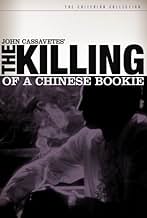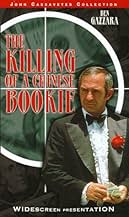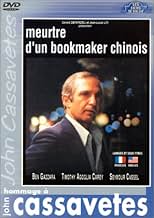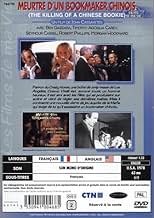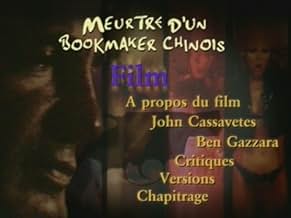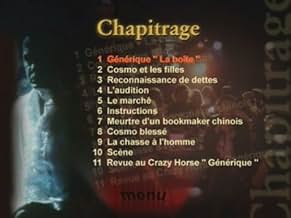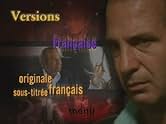एक घमण्डी स्ट्रिप क्लब का मालिक खुद से समझौता करने के लिए मजबूर हो जाता हैं, जब जुए की लत के कारण उपद्रवियों के चक्कर में फंस जाता हैं, जो उसे केवल एक विकल्प प्रदान करते हैं.एक घमण्डी स्ट्रिप क्लब का मालिक खुद से समझौता करने के लिए मजबूर हो जाता हैं, जब जुए की लत के कारण उपद्रवियों के चक्कर में फंस जाता हैं, जो उसे केवल एक विकल्प प्रदान करते हैं.एक घमण्डी स्ट्रिप क्लब का मालिक खुद से समझौता करने के लिए मजबूर हो जाता हैं, जब जुए की लत के कारण उपद्रवियों के चक्कर में फंस जाता हैं, जो उसे केवल एक विकल्प प्रदान करते हैं.
- Flo
- (as Timothy Agoglia Carey)
- The Accountant
- (as John Red Kullers)
- Margo Donnar
- (as Donna Marie Gordon)
फ़ीचर्ड समीक्षाएं
It's an admirable film in concept, a sort of gangster movie focused entirely on characters, with very natural dialogue (surprisingly most of it was scripted, I would've guessed it was improvised for the most part) and some interesting visuals, as interesting as Cassavetes could manage with his miniscule budget anyhow. Yet much of the time it doesn't just seem like wanking, it IS wanking. Moreover, for all the hoopla over how formally interesting the movie is it's barely even all that cinematic, seeming more like experimental theater at times. Ben Gazzara is terrific, the saving grace of the film and the only thing which I really cared about while watching it. With a mildly interesting but still amateurish director helming the movie this couldn't be the sort of thing it wants to be. If it is not visually sophisticated, if the visual storytelling is not strong enough, it needs narrative pull from the script. It doesn't have any. Moreover, it's a character piece in which none of the characters are even remotely interesting, unless you're the sort who pats films on the back for daring to portray a character who has a certain occupation as something other than an archetype.
Now of course I will get people telling me I'm an absolute moron and can't handle anything slow or lacking in explosions and cleavage, but many times during "The Killing of a Chinese Bookie" I couldn't help but think back to "The Conversation". That's a 'slow' movie not dissimilar to this in some respects. That's also a great movie. This isn't. I think it's pretty easy to explain that as the difference between sophisticated craft and amateurish, occasionally interesting craft. The 1976 cut is a chore to sit through, and I don't think I'll ever bother with the 1978 cut.
No film even compares to the feeling, certainly no piffle Koyannisqatsi. But a few filmmakers come close to this totality as something felt. Cinema is nothing in a large sense, that is until a certain point where it becomes a most powerful tool for enlightenment. Cassavetes is one of those guys, and knows just how to use it.
So I revisited this after many years as part of my Cassavetes series, this time watching the extended version. The shorter one may be tighter, more focused, but I'll always opt for a longer stay in his world.
The film is the perfect summer night movie, one to watch with the distant sound of motor noise flowing through open windows. Cassavetes loves the night, the neon signs, the sound of traffic, the hubbub of the nightclub, the brushing of people in close spaces. The film is full of extremely memorable spaces, years later I could recall Cosmo standing in the entrance of his club, the backalley where he's beaten up, the empty highway, the phonebooth in the middle of nowhere, running from the Chinaman's house.
Here, Cassavetes stretches two things. The existential noir where desire, not even so much for poker money, the desire it seems to look comfortable in front of people, summons the noir darkness. Usually in a noir, from that point we get some hallucinative fooling with the narration, here completely merged with the flow of things. The murky proposal for the kill in the cramped car, nothing telegraphed. The subtle menace and helplessness around the gangsters. The foreshadowing bang of the flat tire. The inescapable framing where he was the stooge of fate all along.
And a more gentle self-reference, where Cosmo, standing for Cassavetes, gambles with money-people and loses. These mafia executives want from him a straightforward movie that ends with a killing, the simplest stuff, which he grudgingly delivers. The starkest contrast from the fancy, lively improvisation going on in his club, that both reflects and ribs at Cassavetes' own stuff. He does it his way of course, with fumbling, confusion and uncertainty. And still succeeds. Only The Long Goodbye rivals it in the crime sweepstakes of the 70s, no doubt inspired by this.
Here, because of the adoption of genre with its clear horizon, the tethers are easier than previous Cassavetes films. Oh there is the anxiety, but that is part and parcel of the greater life. More than any of his films though, it achieves that sublime floating sense that encompasses a concrete totality.
His camera excites me like no one else's. Antonioni adopts the transcendent position. Tarkovsky the one of flowing mind. Cassavetes adopts the position of tentative coming-into-being, his visual space has a thick and viscous quality, it has time, it has a tangible and floating gravity, all things coming to be and vanishing again in a cosmic vitality.
Cosmo, a man of cosmic vitality. All through the gangster stuff, Cosmo keeps worrying about the show and the club. Because the show and the atmosphere around his club are of the soul of this man, the images and living space worth living for—dreamy and spontaneous, scented air, a little sloppy because it is re-discovered each night. But that is as much a role, the entrepreneur, as that of the killer, the gambler, the suave playboy, masks for the night. Not the original face.
Deep down I get the sense of a weary joy that runs deeper than happiness, a mono no aware.
Something to meditate upon.
Yet, it's very difficult not to be compelled by the story, especially as embodied in the character of Cosmo Vitelli, who Ben Gazzara seems to channel effortlessly, as if he were a second, transparent skin.
Cosmo is a fascinating character. He owns a rather ratty strip club/cabaret joint on the Sunset Strip that fronts production values and performers of the qualities mentioned earlier, does middling business, and spends nearly every dime he makes "living the high life" or the "the image" of what someone in his profession should espouse. He swills $100 bottles of Champagne, cruises around town in his plush chauffeured Caddy, an entourage of bimbettes in tow, usually to a dive mob-run poker joint that inevitably lands him in massive debt.
He would be an easy character to scorn or mock in another film, but not as Gazzara and Cassavetes portray him. Cosmo is proud of his little world and his accomplishments, and further more, could not give a damn if anyone doesn't approve of them. "You have no style," he sneers at gangster Al Ruban early in the film after the thug condescends to him.
As weird as it sounds, you have to respect someone like that, even when he finds himself increasingly trapped by circumstances and succumbing to self-doubt. At the end of the picture he says how important it is to "feel comfortable" with oneself and while we don't believe for a second that Cosmo really feels this way, we know he *wants* to. It's a refreshingly human response in a movie that only contains more of the same.
It's not a conventional audience pleaser by any means, but if you've watched other Cassavetes pictures and like his candid stream-of-consciousness style, give the 1978 edited version of "Bookie" a watch before you see the original. Cass not only cut half an hour of footage, he did it with (what else?) incredible style and creativity, really tightening the structure of the film as a whole, considerably juicing its already engaging premise.
Quite possibly the most overlooked gem from one of the '60s and '70s most commercially under-appreciated directors.
The plot of 'Bookie' is pretty straightforward. A strip club owner gets into debt with the Mob and is pressured into murdering a bookie. Other directors such as Scorsese or Frankenheimer or Friedkin or Mann could have made an tight, exciting thriller out of such a plot. But John Cassavetes goes for a completely different approach, and doesn't play by "the rules". He ignores the obvious way of proceeding, slows things down, focuses on characters and relationships and moments, and ends up with a cinematic poem.
That may sound pretentious to some, so be it, but that's what it is. The beauty of the photography combined with the improvised dialogue by some of the best character actors of American post-War movies (Gazzara, Cassel, Carey), makes this movie unique. There's nothing quite like this movie, and it's one that if you sit back and just let it do its thing, will remain absolutely unforgettable.
One of the 1970s greatest achievements.
क्या आपको पता है
- ट्रिवियाDavid Bowie was often present on set during the filming and can be seen in shots of the crowd at Cosmo's Crazy Horse West.
- गूफ़Flo says "That jerk Karl Marx said opium is the religion of the people."
While the actual Marx quote is "Religion is the opiate of the masses", this is likely to be an intentional misquote from the gangster, showing a lack of true education.
- भाव
Cosmo Vitelli: Now, teddy. Teddy. Everything takes work. We'll straighten it out. You know. You gotta work hard to be comfortable. Yeah, a lot of people kid themselves, you know. They-they know when they were born, they know where they're goin'... they know whether they're gonna go to heaven,whether they're gonna go to hell. They think they know that. They kid themselves. Right? But the only people... who are, you know, happy... are the people who are comfortable. That's right. Now, you take, uh, uh, carol, right? A dingbat, right? A ding-a-ling.A dingo. That's what people think she is,'cause that's the truth they want to believe. But, uh, you put her in another situation, right? Put her in a situation that's tough. Stress. Where she's up against something,you'll see she's no fool. Right. 'cause what's your truth... is my falsehood What's my falsehood is your truth and vice versa. Well, look. Look at me, right? I'm only happy when I'm angry... when I'm sad, when i can play the fool... when i can be what people want me to be rather than be myself.
- क्रेज़ी क्रेडिटOpening scene has Chinese characters scrolling up, similar to a movie from China or Hong Kong.
- इसके अलावा अन्य वर्जनThe original version runs 135 minutes. Two years after the release director John Cassavetes prepared a different theatrical cut with a running time of 108 minutes, both adding and removing scenes resulting in a different film.
- साउंडट्रैकI Can't Give You Anything but Love
(uncredited)
Music by Jimmy McHugh
Lyrics by Dorothy Fields
Performed by Meade Roberts and others
टॉप पसंद
- How long is The Killing of a Chinese Bookie?Alexa द्वारा संचालित
विवरण
- रिलीज़ की तारीख़
- कंट्री ऑफ़ ओरिजिन
- भाषा
- इस रूप में भी जाना जाता है
- Smrt kineskog kladionicara
- फ़िल्माने की जगहें
- Gazzarri's, 9039 Sunset Blvd., वेस्ट हॉलीवुड, कैलिफोर्निया, संयुक्त राज्य अमेरिका(Interior and exteriors. Cosmo Vittelli's nightclub, Crazy Horse West.)
- उत्पादन कंपनी
- IMDbPro पर और कंपनी क्रेडिट देखें
बॉक्स ऑफ़िस
- दुनिया भर में सकल
- $19,399
इस पेज में योगदान दें



